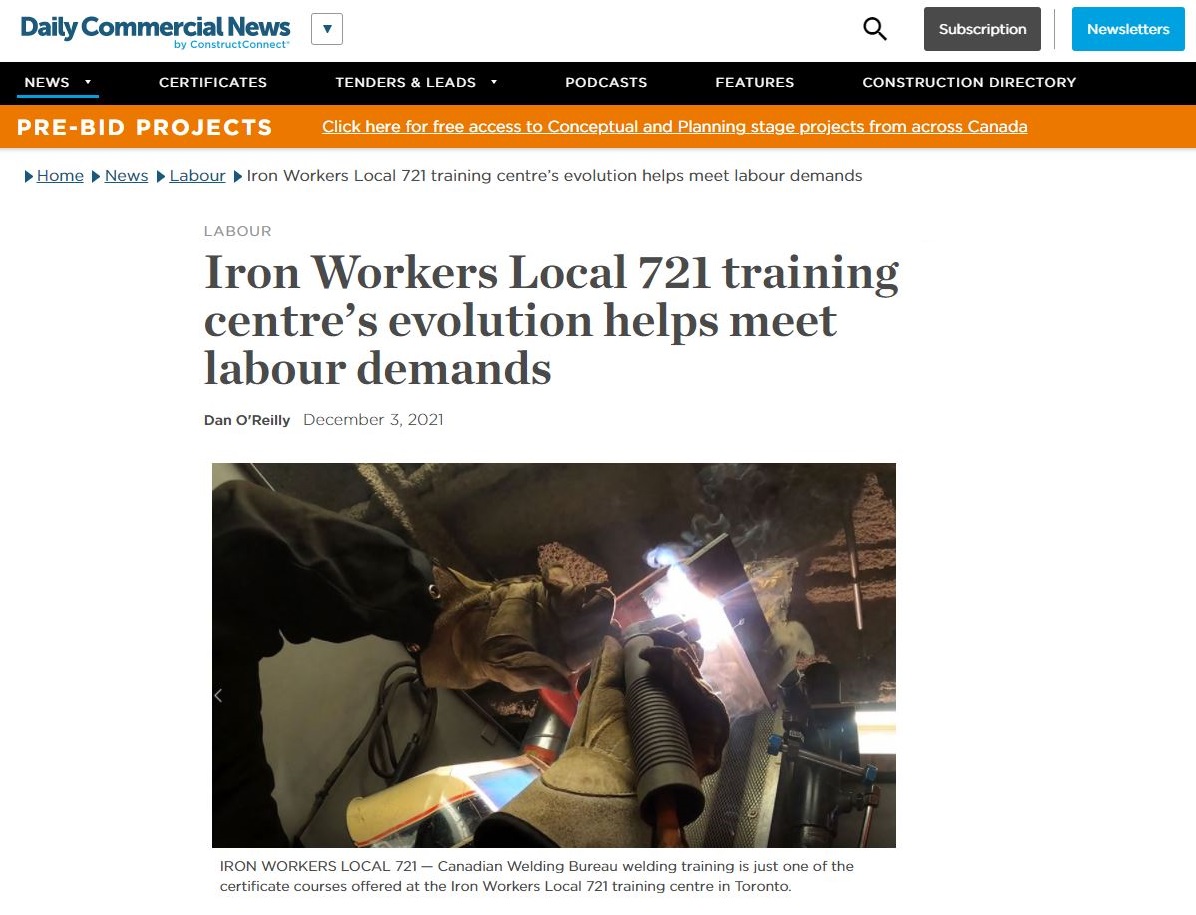The Iron Workers Local 721 training centre has evolved to reflect the changes the trades themselves have experienced from recruitment to curriculum.
The training centre in Toronto is the largest of 15 training facilities operated across Canada by the International Association of Bridge, Structural, Ornamental and Reinforcing Iron Workers. The facility underwent a $12 million expansion and modernization in late 2018 to meet the growing need for skilled workers.
“We haven’t had a slowdown (in work) in the Toronto area since 2008,” says Local 721 president Luiz Barros, in emphasizing the need for a well-trained and diversified workforce.
At one time a “club mentality” dominated the industry and potential workers (almost exclusively male and white) needed connections to get into it. That’s no longer the case, says Barros, citing the influx of women and visible minorities into the trade.
As well, the industry is attracting college graduates in their late 20s to their early 40s who either can’t get positions in their chosen field or want more lucrative work, he says.
“It doesn’t matter who you are or what you’re background is, if you can do the work and are willing to work, we want you,” adds the centre’s business manager, Fred Macpherson.
Iron Workers are physically involved in the placement of structural steel and reinforcing steel (rebar) and the union has 23,000 members in Canada, with a total of 125,000 in North America. With 4,100 members, Local 721 is also the largest iron workers local in Canada.
Tucked just off of busy Kipling Avenue in Toronto’s south Etobicoke region, the centre serves a geographic area stretching from Oakville to Belleville to north to Ontario’s Muskoka region.
“Of 340 placements in 2020, we had a 90 per cent retention rate,”
— Clinton Knowlton
Iron Workers Local 721
Its many features include three classrooms, practical work training areas such as a welding shop, and a five-storey-high mock-up of structural steel building. The largest of its kind in North America, it is taken down and reassembled by apprentices as part of their training. It is also used for holding competitions.
Other features include a board room, a machine shop, a computer room with a virtual welding machine, an auditorium, and a dispatch office which matches workers with jobs.
Just a sampling of the certificate courses taught there include working at heights, forklift operator safety, propane handling, confined workspace rescue, and rigging safety. Some of the skills upgrading courses available include introduction to curtain walls, high angle rope rescue, and foreman training.
Course fees and, indeed, the centre’s entire operating costs, are financed through the “field dues” or members’ payroll deductions, which are negotiated with employers as part of the contract negotiations, says Macpherson.
All of the courses are taught by an in-house six-member teaching staff, all of whom previously worked in the industry including apprentice co-ordinator Clinton Knowlton, who oversees the training programs.
In that role, he tracks all 800 apprentices as they progress through their apprenticeship, issues 2,000 pay raise notices each year, and schedules trade school classes and all Journeyman upgrading courses.
Training is targeted to the industry’s two different streams; rodwork or the installation of rebar, and structural steel, which encompasses a myriad of tasks from erecting building columns, installing curtail walls, to industrial maintenance work such as the installation of assembly lines in automotive factories, says Knowlton.
Ironwork apprentices must complete 6,000 hours of on-the-job experience and three terms of in class training. For rodworkers, the requirement is 4,000 hours and two sessions of training. The payoff for all that effort is secure, well-paying jobs that easily exceed $100,000 a year once they reach journeymen status.
“A first year apprentice is paid $42.07 an hour (in pay and benefits) and after completing every 1,000 hours they receive a raise.”
Named the centre’s Outstanding Apprentice in 2000 after winning third place in the Ironworkers International Apprentice Competition in Florida, Knowlton started as an apprentice instructor in 2005 and then assumed his present position in 2007. In the intervening years he has seen the evolutions in training.
“When I started here we had 270 apprentices and one classroom. Now, we have 800 apprentices and three classrooms,” says Knowlton, adding that sometimes the centre’s auditorium has to be transformed into a fourth classroom.
A concentrated effort is made to attract potential apprentices, who learn about the centre through a variety of methods such as referrals from schools or union members. After being interviewed, they must take both a math and mechanical aptitude test. Successful candidates take a two-week job readiness program and then are matched with employers, says Knowlton.
“Of 340 placements in 2020, we had a 90 per cent retention rate.”
Although there are new people entering the industry, the iron workers union still benefits from a seasoned labour force, says Barros, the local’s president.
“We have members in their 70s who are still working. A full 20 per cent of our membership could retire today if they wanted to.”
A major advantage of retaining those older workers is that they serve as mentors to the newer generation, says Barros.
Apart from the pay and benefits and secure employment, union members have the satisfaction at looking at any number of structures and saying: “I helped build that.”

